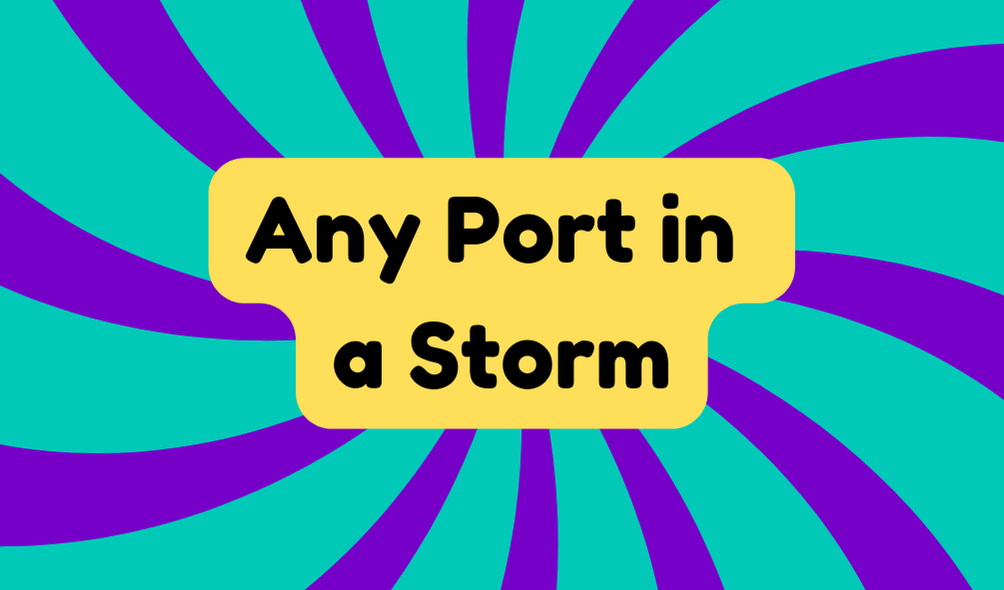The phrase "any port in a storm" suggests a focus on finding immediate solutions during tough times, regardless of their perfection. This reflects a practical mindset, valuing adaptability and resourcefulness over idealistic fixes. Although quick solutions may offer temporary relief, they may also lead to further complications. In crises, people are often urged to utilize available resources, showcasing resilience. By understanding this concept, individuals can better navigate their challenges and discover more effective strategies for dealing with adversities.
Synonyms
In traversing challenging situations, various synonyms for the phrase "any port in a storm" illustrate a shared theme of seeking practical solutions. These alternatives emphasize the value of adaptability and resilience, essential components of effective crisis management.
- A quick fix
- Emergency measure
- Stopgap solution
- Makeshift remedy
While these terms capture the essence of urgency, they often suggest a compromise in quality. Consequently, while embracing available solutions, one must also consider their long-term impacts, as shortcuts may lead to further complications. Understanding this balance is critical for innovative problem-solving during crises.
Example of Sentences
Finding one's way through challenging times often leads individuals to adopt the mindset of using whatever resources are at hand, encapsulated by the phrase "any port in a storm." This saying illustrates the reality that perfect solutions are rarely available when difficulties arise, emphasizing the need for practical, albeit imperfect, options.
- Utilizing available technology for rapid crisis management can yield practical solutions.
- Turning to community resources reflects adaptability in emergencies.
- Prioritizing immediate needs often means compromising on ideals.
- Collaborating with diverse teams can generate innovative, albeit temporary, fixes.
This pragmatic approach is essential for maneuvering through crises effectively.
Origin
The phrase "any port in a storm" has an intriguing and somewhat obscure origin that dates back to the 18th century. First appearing in John Cleland's novel "Memoirs of a Woman of Pleasure" in 1749, its precise origin remains uncertain, leaving room for speculation regarding its prior familiarity among audiences. This phrase evolution reflects a shift in societal attitudes towards problem-solving, as literary references highlight the acceptance of imperfect solutions during crises. Over time, it has woven itself into colloquial and literary discourse, emphasizing resilience in adversity while challenging the idealistic pursuit of perfect answers in difficult situations.
Collocations
Collocations associated with the phrase "any port in a storm" reveal the various ways this expression is integrated into everyday language. These collocation examples emphasize adaptability in crises, although they can also signal a lack of discernment. Understanding collocation types clarifies their implications:
- Seek options – Highlighting the urgency in decision-making.
- Accept compromises – Indicating a practical mindset.
- Navigate difficulties – Showcasing resilience despite challenges.
- Find solutions – Encouraging resourcefulness in adversity.
While the phrase captures a pragmatic approach, it subtly warns against settling for inadequate solutions, urging critical evaluation instead.
How to Use in Everyday Language
In challenging situations, using the phrase "any port in a storm" can effectively communicate the need for practical decision-making. This idiom is especially useful in casual conversations or during crisis management, where the focus is on finding workable solutions rather than ideal ones. The following table illustrates scenarios where this phrase can apply:
| Scenario | Context | Outcome |
|---|---|---|
| Job loss | Seeking temporary employment | Survival over perfect job |
| Project failure | Adopting alternative strategies | Completion over ideal results |
| Relationship issues | Accepting help from friends | Support over solitude |
Understanding its application enables individuals to navigate adversity with resilience.
Why Is It Still Relevant Today?
Although some may view proverbs as outdated or overly simplistic, "any port in a storm" continues to resonate in modern society, particularly in times of uncertainty. In today's fast-paced world, where crises are frequent and often unpredictable, this saying emphasizes the need for practical solutions over the ideal. Organizations and individuals alike must adopt flexible approaches in crisis management, recognizing that sometimes an imperfect choice can be more effective than inaction. By embracing this mindset, people can traverse challenges with resilience, prioritizing adaptability over perfection. Consequently, the proverb remains an essential reminder in maneuvering the complexities of contemporary life.







